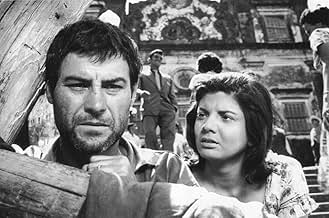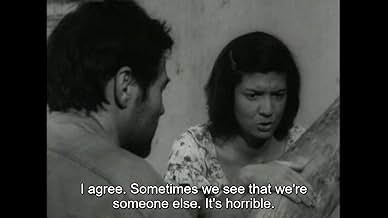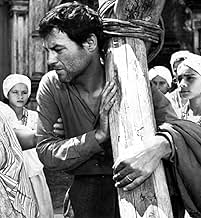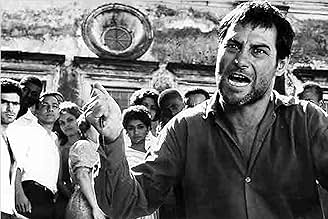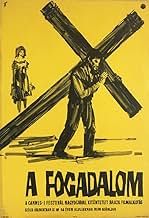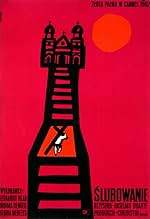NOTE IMDb
8,3/10
4,4 k
MA NOTE
Un chrétien simple mais dévoué fait un vœu à Sainte Barbara après qu'elle ait sauvé son âne, mais tous ceux qu'il rencontre semblent déterminés à se méprendre sur ses intentions. Sera-t-il c... Tout lireUn chrétien simple mais dévoué fait un vœu à Sainte Barbara après qu'elle ait sauvé son âne, mais tous ceux qu'il rencontre semblent déterminés à se méprendre sur ses intentions. Sera-t-il capable de tenir sa promesse à la fin ?Un chrétien simple mais dévoué fait un vœu à Sainte Barbara après qu'elle ait sauvé son âne, mais tous ceux qu'il rencontre semblent déterminés à se méprendre sur ses intentions. Sera-t-il capable de tenir sa promesse à la fin ?
- Réalisation
- Scénario
- Casting principal
- Nommé pour 1 Oscar
- 4 victoires et 1 nomination au total
Leonardo Villar
- Zé do Burro
- (as Leonardo Vilar)
Antonio Pitanga
- Coca
- (as Antonio L. Sampaio)
João Di Sordi
- Police Detective
- (as João Desordi)
Veveldo Diniz
- Sacristão
- (as Velvedo Diniz)
Napoleao Lopes Filho
- Bispo
- (as Napoleão L. Filho)
Avis à la une
This great film, received the principal prize in Cannes and it is one of the best Brazilian films of all the times. A simple man, whose donkey was sick, gets its cure and he decides like this to pay a promise Saint Barbra, to who attributed the salvation of the animal.
Main representative of the brazilian "Cinema Novo" , the film is based on an exceptional play, and it is a realistic film, very well interpreted and driven, and it shows one on the most dramatic sides of the Brazilian people: the fidelity in paying a promise, cost what to cost!
Main representative of the brazilian "Cinema Novo" , the film is based on an exceptional play, and it is a realistic film, very well interpreted and driven, and it shows one on the most dramatic sides of the Brazilian people: the fidelity in paying a promise, cost what to cost!
One of those overlooked Films in Cinema History, Honest, multi-layered and amazingly contemporary, this is one of those movies that have admirably stood the test of time, add to that Winning the prestigious Palm d'Or at Cannes 1962.
In my opinion this is one of the best Brazilian movie ever made and also the best movie about religion and its implications to a society in general.
It is a mix of religion, politic, culture, beliefs, prejudices, intolerance. It starts as a simple and innocence gesture from a poor man to pay homage to a Saint after his donkey gets miraculous healed, but instead it becomes a bizarre show of enormous proportions. The authority of the church, the misleading politicians, the media and the crowd use the cause for their own gain. It's a battle between the bureaucracy of norms and the innocence of simple causes. Amazing performances by the main cast.
This movie was awarded with Palme D'Or and the Oscar candidate for Brazil.
THIS IS A MUST SEE MOVIE, it worth every minute of it.
It is a mix of religion, politic, culture, beliefs, prejudices, intolerance. It starts as a simple and innocence gesture from a poor man to pay homage to a Saint after his donkey gets miraculous healed, but instead it becomes a bizarre show of enormous proportions. The authority of the church, the misleading politicians, the media and the crowd use the cause for their own gain. It's a battle between the bureaucracy of norms and the innocence of simple causes. Amazing performances by the main cast.
This movie was awarded with Palme D'Or and the Oscar candidate for Brazil.
THIS IS A MUST SEE MOVIE, it worth every minute of it.
A shame such an important movie has no poster here on IMDb. I wanted to add the one that is used on Wikipedia, but I would have to pay to do that. Strange. (Edit: it has a poster now.)
If you are critical of religion fanaticism, you must see this movie! It shows what can become of fanatic people, how lack of education plays an important role in fanaticism, the arrogance of the church and the hypocrisy of our society.
Zé do Burro (Joe of the Donkey) has the soul of a child. He is a good guy, but extremely naive. His naivety is shamelessly exploited, and people cruelly distort his good intentions, making an evil person out of him, when all he wanted was to do good.
The movie won the Golden Palm in Cannes and other prizes. It's a classic. Dialogs are a bit theatrical (only if you understand Portuguese), but so they used to be that time. A movie that will get under your skin.
If you are critical of religion fanaticism, you must see this movie! It shows what can become of fanatic people, how lack of education plays an important role in fanaticism, the arrogance of the church and the hypocrisy of our society.
Zé do Burro (Joe of the Donkey) has the soul of a child. He is a good guy, but extremely naive. His naivety is shamelessly exploited, and people cruelly distort his good intentions, making an evil person out of him, when all he wanted was to do good.
The movie won the Golden Palm in Cannes and other prizes. It's a classic. Dialogs are a bit theatrical (only if you understand Portuguese), but so they used to be that time. A movie that will get under your skin.
I love to watch old black and white movies and if you look for the history of foreign films up for an Oskar you find some gems like this movie. Such a real Brazilian movie and especially from Salvador de Bahia, the old capital where the cultural history of Brazil (except for the original people) is present. Colonial white oppression, the corrupt white middle class, the African people with their religious cultures and capoeira, the Catholic Church between them but like always only saving it's own position and then simple campesino who embodies the true values of human kind. In a collusion of them all, feasts, religion and fights occur and turn into a spiritual happening, a cruxifiction in which human dignity prevails. A wonderful movie from times when things seems to be clear.
Le saviez-vous
- AnecdotesFirst Brazilian film to be nominated for an Oscar.
- ConnexionsEdited into A Edição do Nordeste (2023)
Meilleurs choix
Connectez-vous pour évaluer et suivre la liste de favoris afin de recevoir des recommandations personnalisées
- How long is The Given Word?Alimenté par Alexa
Détails
Box-office
- Montant brut mondial
- 8 229 $US
- Durée
- 1h 38min(98 min)
- Couleur
- Mixage
- Rapport de forme
- 1.33 : 1
Contribuer à cette page
Suggérer une modification ou ajouter du contenu manquant

